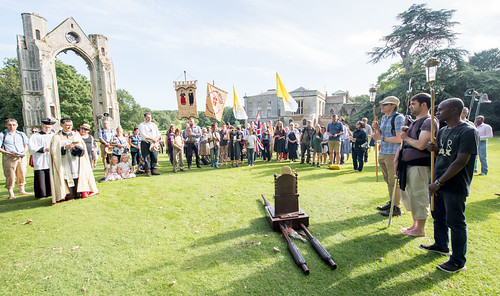 |
| The Latin Mass Society pilgrimage to Walsingham, at the site of the Holy House |
----------------
It might be thought that
it would be better for those attached to the Extraordinary Form to travel
light, and not associate their cause with anything else controversial: to fight
one battle at a time. I know that this is not how the Latin Mass Society’s
members and supporters usually feel, however. On the contrary, while the case
for the holiness and beauty of the Vetus
Ordo can stand on its own feet, the Mass we love points beyond itself, to
the God it worships and the praying Church which it serves. It points not only
to the theological truths it teaches directly, like the communion of Saints,
and the reality of sin and grace, but to the antiquity, majesty, and authority,
of the Church’s teaching in general.
In thinking of the role
of the Traditional Mass, and its adherents, in the wider Church, it is not only
in the directly liturgical area in which we bring a gift to the Church. The
preservation of the ancient Mass is something of inestimable value for the
whole Church, even for those who do not make it a regular part of their
devotional lives. Something else of great value, however, is the existence of a
robust community of believers whose respect for Tradition carries over into the
theological sphere.
The prophet Jeremiah
makes this point very beautifully in relation to the Rechabites of his own day
(Jer 35). This was a community of Judeans who stuck literally to the command of
an ancestor of theirs not to drink wine, and to live only in tents. These
practices are symbolic of a special commitment to holiness of life and
dependence on God, but they must have struck many of their contemporaries as
archaic and unnecessary in the extreme. Jeremiah, however, contrasts the
Rechabites’ fidelity with the widespread impiety and even apostacy of
mainstream Judean society. The Rechabites were a witness of fidelity to
Tradition in ancient Judea, a witness others sorely needed: even if other
Judeans were not personally obliged to abstain from wine or live only in tents.
When it comes to the
moral teachings of the Church, Catholics attached to the ancient liturgy can
almost always be relied upon to hold fast also to the ancient and unchangeable
teaching of the Church, coming from the Apostles, the Fathers and Doctors, and
from Our Lord and Saviour Himself. This fidelity, indeed, is required of
Catholics: not to attach themselves to the latest novelty, but as St Paul
writes (2 Thess 2:15):
Therefore, brethren, stand fast; and hold the
traditions which you have learned, whether by word, or by our epistle.
Itaque fratres state et
tenete traditiones quas didicistis, sive per sermonem sive per epistulam nostrum.
Support the work of the LMS by becoming an 'Anniversary Supporter'.
No comments:
Post a Comment